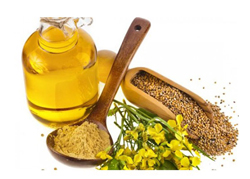
How cold-pressed oils are making a comeback in India
The truth behind edible oils in India and why your choice as a customer matter.
Cooking oil is a vital ingredient in Indian cooking. For thousands of years (since the Harappan civilization), Indians have used cold-pressed oil – coconut, sesame and groundnut oil in the south and west and mustard oil in the north and north-east. These oils were made using a ‘Kachchi ghani’ or ‘Kolu’ – a large mortar and pestle powered by bullocks (and later by electricity).
However, since the 1930s, three major changes took place:
- The launch of ‘Dalda’- a hydrogenated vegetable oil – by Hindustan Unilever (then Lever Brothers). Dalda became extremely popular because it was cheap and had a high melting and smoke point.
- The advent of ‘refined oils’ in the 1950s used a process called solvent extraction that can extract as much as 99 per cent oil using hexane solvent, from even low-oil bearing seeds like cotton, sunflower, soya, and rice bran, which wasn’t possible with mechanical pressing. The oils are further de-gummed, neutralised, bleached and deodorised by treating them with chemicals to attain clarity and consistency.
- India started importing cheap palm oil and ramped up domestic production. Cheap and odourless palm oil is not only responsible for widespread environmental degradation. High in unhealthy saturated fats, it continues to be the main ingredient in processed foods such as instant noodles and biscuits and also is used to adulterate sesame and mustard oils…
The result was a shift in household consumption to refined oils. Not only were they better looking and significantly cheaper, but consumers also believed that they were better for health. In reality, refined oils are far from good for health. They contain harsh chemicals and are stripped of most of their nutrients due to which, many studies link them to chronic ailments such as heart disease, high cholesterol and type 2 diabetes.
In stark contrast, are natural cold-pressed oils traditionally made in India’s ghanis. Ghani’s are a representation of the clean food movement led by Gandhi, as they not only produce nutrient-rich chemical-free oil that’s great for health but also support small-scale industry and rural artisanal livelihoods. Fortunately, in the last decade or so, cold-pressed oils are finding their way back into middle-class Indian kitchens. One of the main reasons for this is a shift in consumer thinking and behaviour. Today’s consumer is more aware, and ask more questions about where their food is coming from and how it impacts their health. Ultimately, the power lies with each one of us as consumers, to make informed food choices for our own good as well as the welfare of our planet.
“The Right to food is the right
to choose what we want to eat;
to know what is in our food; and
to opt for nourishing, tasty food
– not the few packaged goods.”
that corporations want us to consume.”
- Vandana Shiva
Women’s micro-enterprises of Katori have been producing their own premium organic cold-pressed Mustard Oil in-house, from the finest quality of native mustard seeds, grown by our very own network of small and marginal farmers across Rajasthan. Our women artisans ensure that pure virgin oil that comes out of the very first press is bottled and reached to you with its nutrients and flavours intact. Click here to give Katori’s premium cold-pressed mustard oil a try.